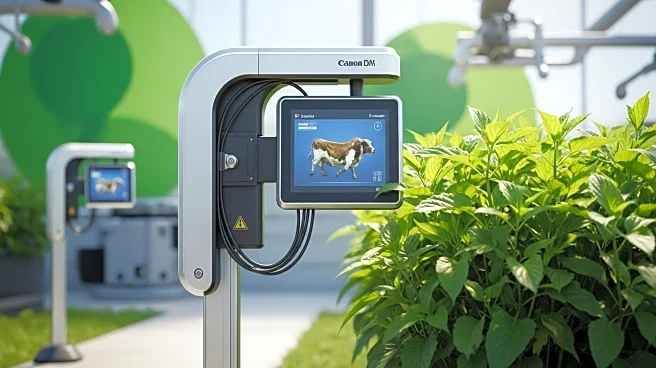What's Happening?
Agrifoodtech funding experienced a significant decline in the third quarter of 2025, dropping by 32% compared to the previous quarter, according to preliminary data from AgFunder. Despite this downturn, the sector saw notable investments in farm management and precision agriculture software startups, particularly those involved in virtual fencing technology. New Zealand-based Halter raised $100 million for its smart collar technology, which allows ranchers to manage livestock without physical fences. Similarly, Nofence secured $35 million for its virtual fencing system. These investments highlight a shift towards innovative solutions in livestock management amidst a broader funding decline. Other notable deals included BinSentry's $50 million raise for feed management and EarthDaily's $60 million for geospatial intelligence. The Innovative Food category, which includes alternative protein startups, also saw growth, with companies like The Protein Brewery and Revyve raising substantial funds.
Why It's Important?
The decline in agrifoodtech funding reflects broader economic challenges and shifts in investment priorities within the sector. The focus on virtual fencing and precision agriculture indicates a growing interest in technologies that enhance efficiency and sustainability in livestock management. These innovations could lead to reduced costs and environmental impact, benefiting farmers and the agricultural industry. The rise in funding for alternative protein startups suggests a continued demand for sustainable food solutions, which could drive long-term changes in consumer habits and food production. As agrifoodtech adapts to these trends, stakeholders in agriculture and food technology may need to reassess their strategies to align with evolving market demands.
What's Next?
The agrifoodtech sector may continue to see investments in technologies that offer practical solutions to current agricultural challenges. As virtual fencing and precision agriculture gain traction, more startups may emerge, seeking to capitalize on these innovations. The focus on alternative proteins could lead to further advancements in food technology, potentially reshaping the food industry. Investors and companies will likely monitor these trends closely, adjusting their strategies to leverage emerging opportunities. Additionally, the sector may face increased scrutiny regarding the sustainability and ethical implications of new technologies, prompting discussions on best practices and regulatory measures.
Beyond the Headlines
The shift towards virtual fencing and alternative proteins highlights broader ethical and environmental considerations in agriculture. These technologies offer potential solutions to issues such as land use, animal welfare, and resource management. As the industry evolves, stakeholders may need to address the long-term impacts of these innovations on traditional farming practices and rural communities. The emphasis on sustainable food production could also influence cultural perceptions of food consumption, encouraging a move towards more environmentally friendly diets. These developments may prompt further research and policy discussions on the future of agriculture and food technology.










